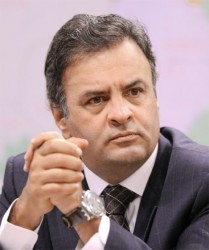If opposition candidate Aecio Neves wins Brazil’s October 26 runoff election — a possibility that virtually no pollster is ruling out — South America’s biggest country would “de-politicize” its foreign policy and end 12 years of preferential ties with Venezuela, Argentina and other leftist governments, top aides to Neves say.
Neves, a former state governor and candidate for the pro-business Social Democratic Party, was the big surprise in Sunday’s first-round vote. He shot up from third place in the polls to a second-place finish in Sunday’s election, qualifying him to challenge President Dilma Rousseff of the leftist Workers Party. She received 42 per cent of the vote.
The second round is likely to be decided by supporters of defeated opposition candidate Marina Silva, who received 21 per cent. Most political analysts agree that Silva won’t back Rousseff in the runoff because she is bitter at the president for having attacked her with unusual harshness during the campaign.
“It is widely expected that Marina (Silva) will make a public statement in support of Aecio (Neves,)” says Murillo de Aragao, head of Brazil’s Arko political analysis firm. “Dilma Rousseff is in a very difficult situation because 55 per cent of Brazilian voters are wanting a change.”
In a telephone interview on Monday, Rubens Barbosa, head of the Neves’ campaign foreign policy team, told me that if his candidate wins the runoff election, Brazil will put an end to its foreign policy of the past 12 years, which he defined as based on “ideological affinities” rather than Brazil’s national interests.
“If Aecio wins, there will be a very big change in Brazil’s foreign policy in the region,” said Barbosa, a former Brazilian ambassador to Washington. “There will be a total depoliticization of Brazilian policy toward other Latin American countries. We are going to diversify our partnerships with all countries in the region, regardless of their ideologies.”
Asked to elaborate, Barbosa said Brazil’s foreign policy, which started under former President Luiz Inácio Lula da Silva, is based on prioritizing ties with members of South America’s Mercosur economic bloc. The regional alliance is made up of Brazil, Argentina, Venezuela, Uruguay and Paraguay.
But Brazilian exporters complain that Mercosur has been an obstacle to Brazil’s growth, because it prevents Brazil from individually signing a free trade agreement with the 28-member European Union, or any other non-member country. Mercosur’s rules demand that any free trade deal be negotiated by all Mercosur members countries, and both Argentina and Venezuela oppose such extra-regional negotiations.
Barbosa said that a Neves government would reach out to the European Union, and pro-market economies such as Mexico, Chile, Colombia and Perú in search of new trade agreements.

If Argentina and Venezuela oppose such extra-regional trade talks, “we would not take any option off the table,” he said, suggesting that Brazil may team up with Uruguay and Paraguay regardless of Argentina and Venezuela’s opposition.
“We would have a much stronger relation with developed countries, without jeopardizing our ties with developing countries,” Barbosa said.
He added that “currently, Brazil’s policy is to give an absolute priority to South-South relations, and to put relations with developed countries on a second level. Our programme calls for giving the same importance to our ties with developed countries as with developing countries, in order to seek new technologies and innovation in developed countries.”
My opinion: This will be a very tight race, in which anything can happen. We can’t rule out that President Rousseff could win the runoff vote despite her mediocre showing in Sunday’s first round. There will be four debates between now and the October 26 vote, and Rousseff’s team has proven to be very effective waging negative campaigns against her opponents.
Also, as happened in Colombia’s recent elections, when President Juan Manuel Santos won the runoff election thanks to voters who had abstained in the first round, Rousseff could still be re-elected if she gets a substantial percentage of the almost 20 per cent of voters who abstained in the first round to turn out and vote for her in the second round.
But if pollsters and political pundits are right in interpreting that the key message of Brazil’s first round vote was that 55 per cent of Brazilians want a change, and that Neves seems to embody that desire for change, we may indeed see a major change in Brazil’s domestic and foreign policies. We may even see closer ties with the United States, and a change in Latin America’s political map after more than a decade of leftist predominance.
© The Miami Herald, 2014. Distributed by Tribune Media Services.






